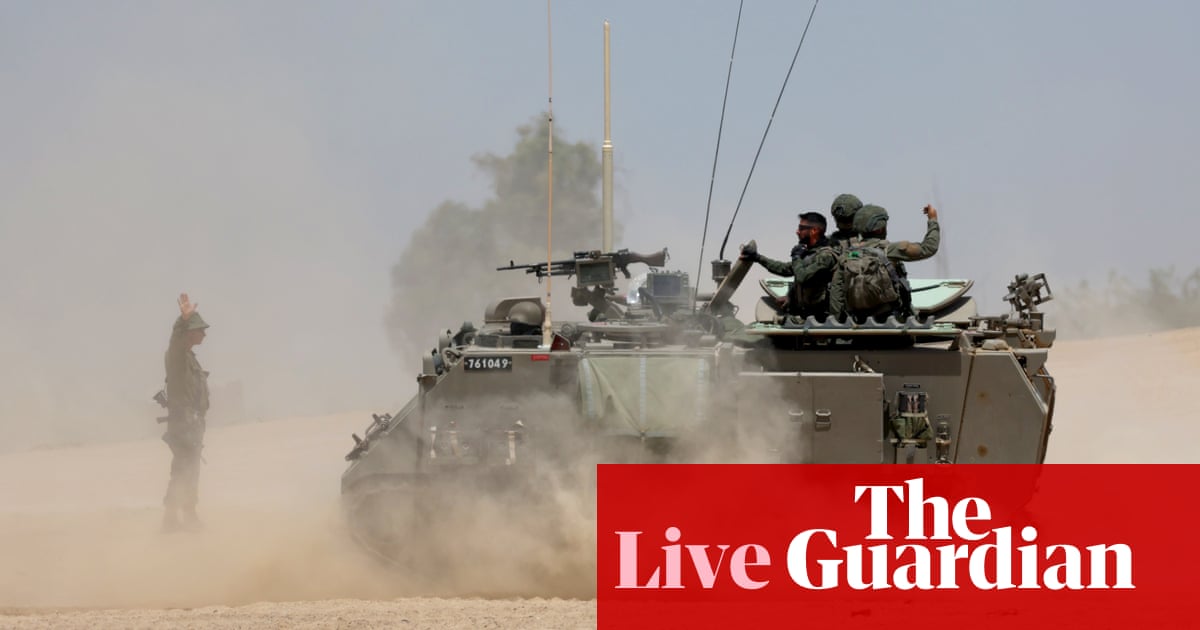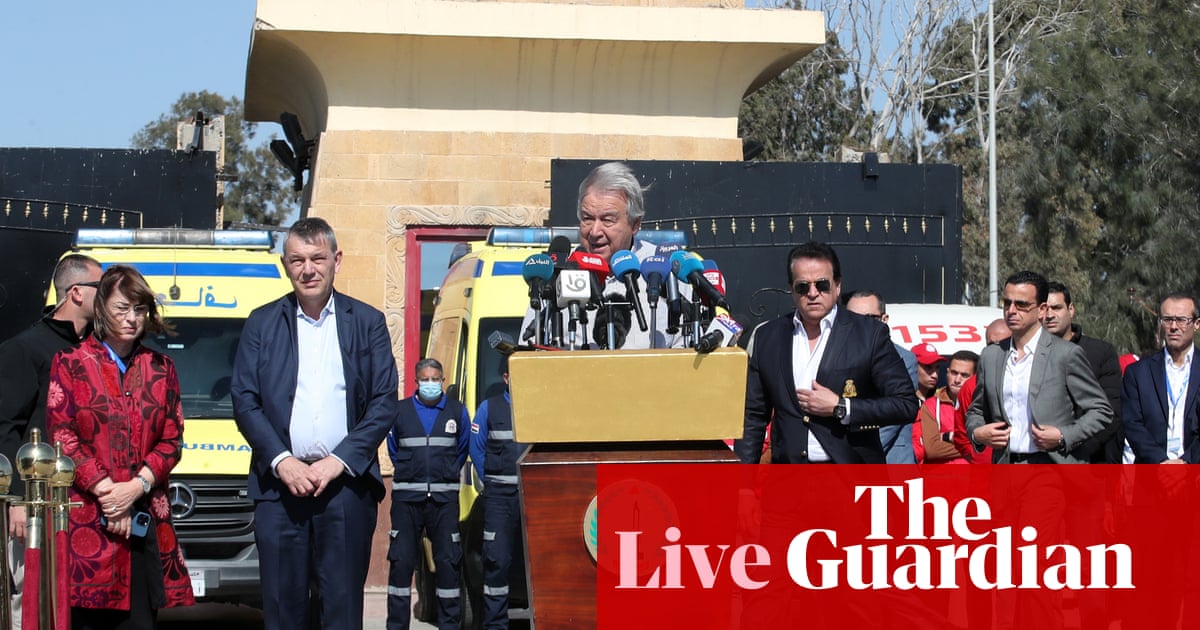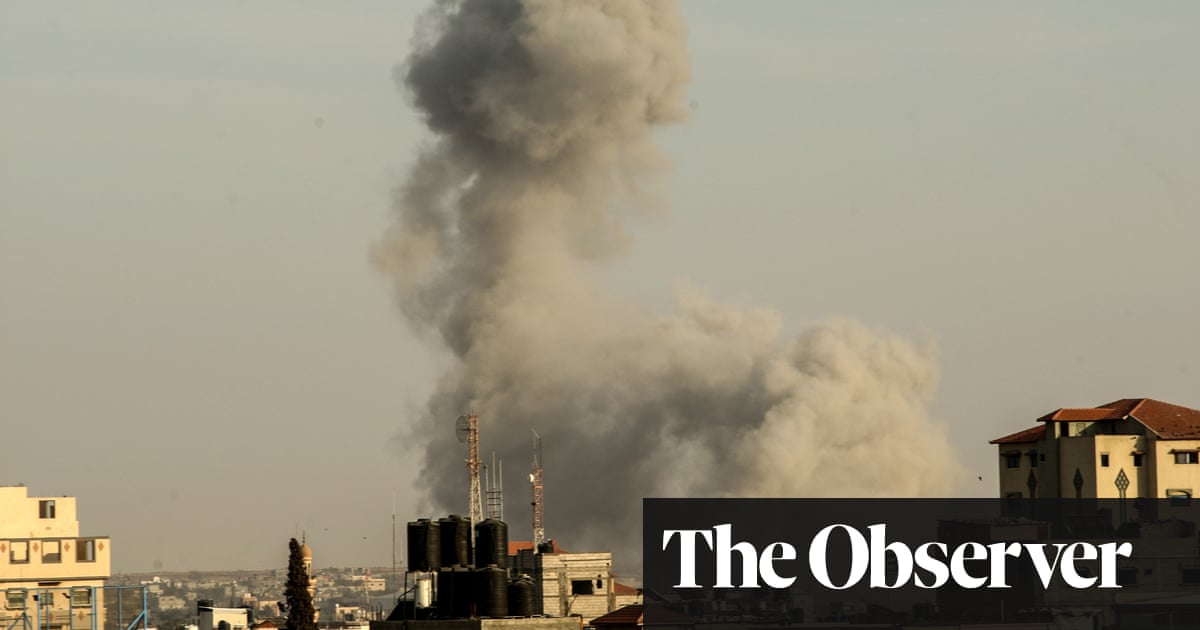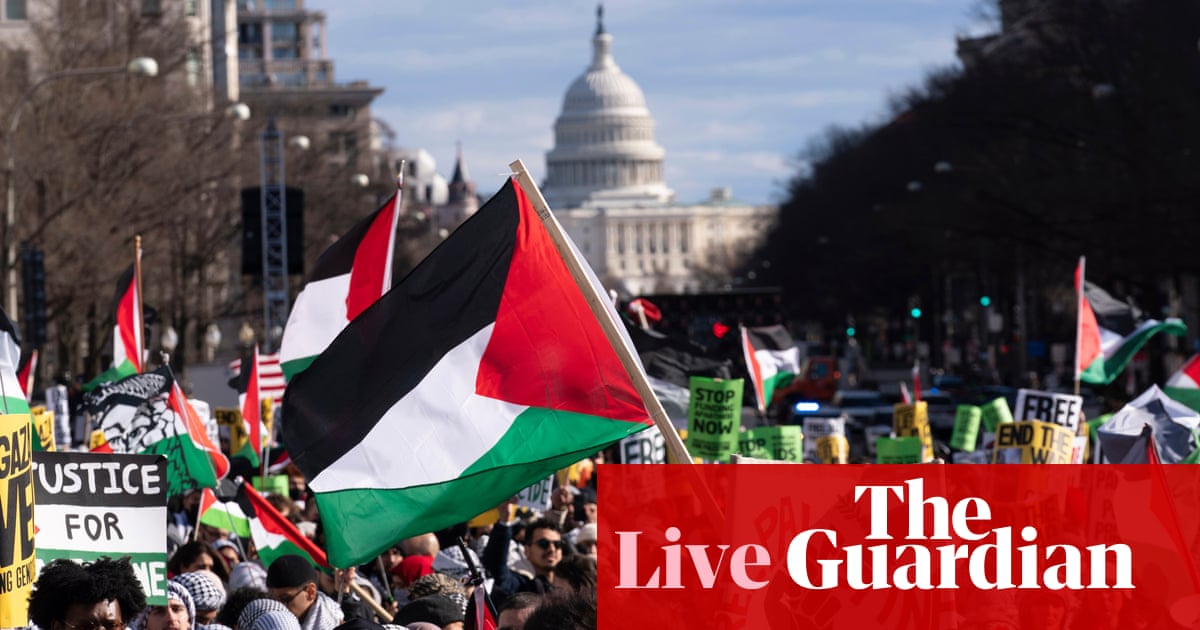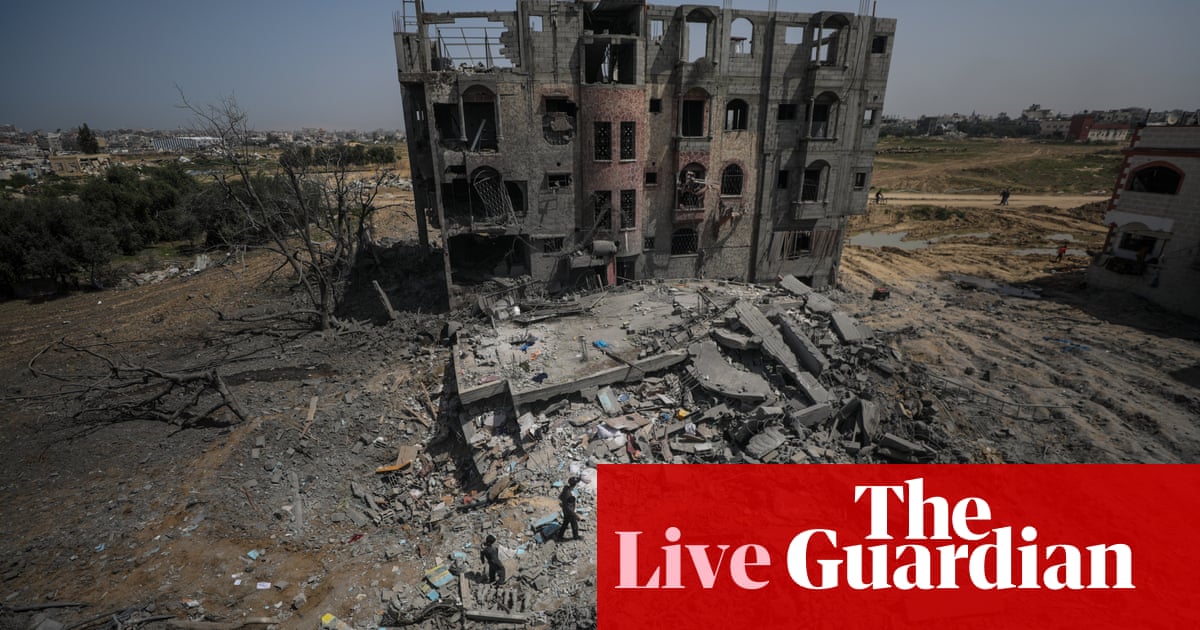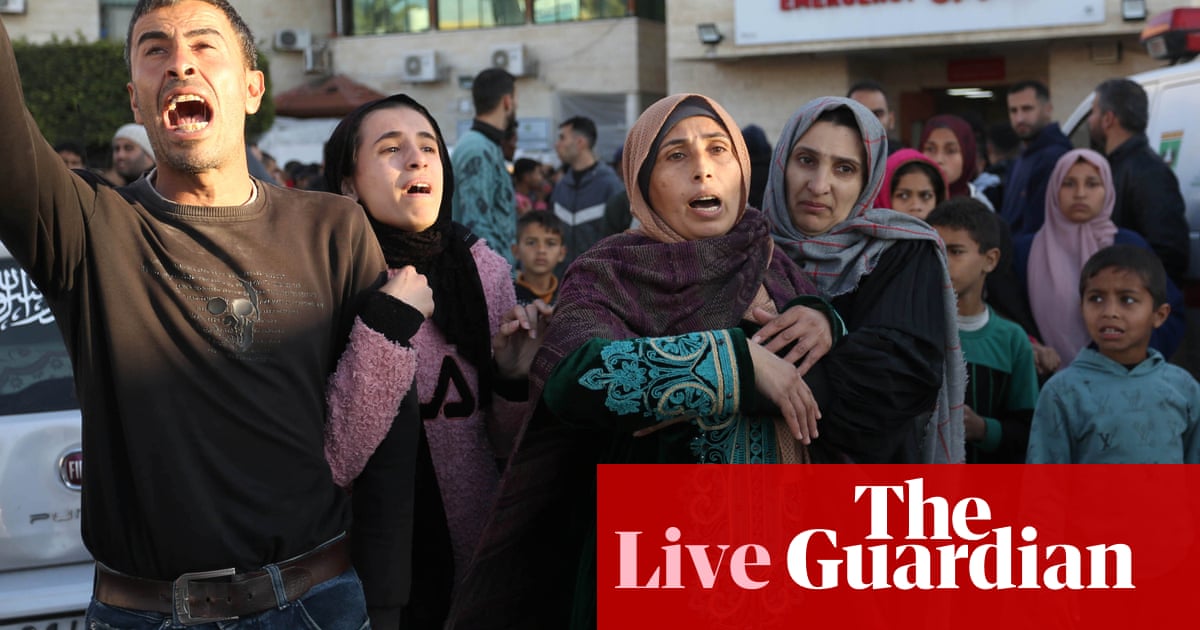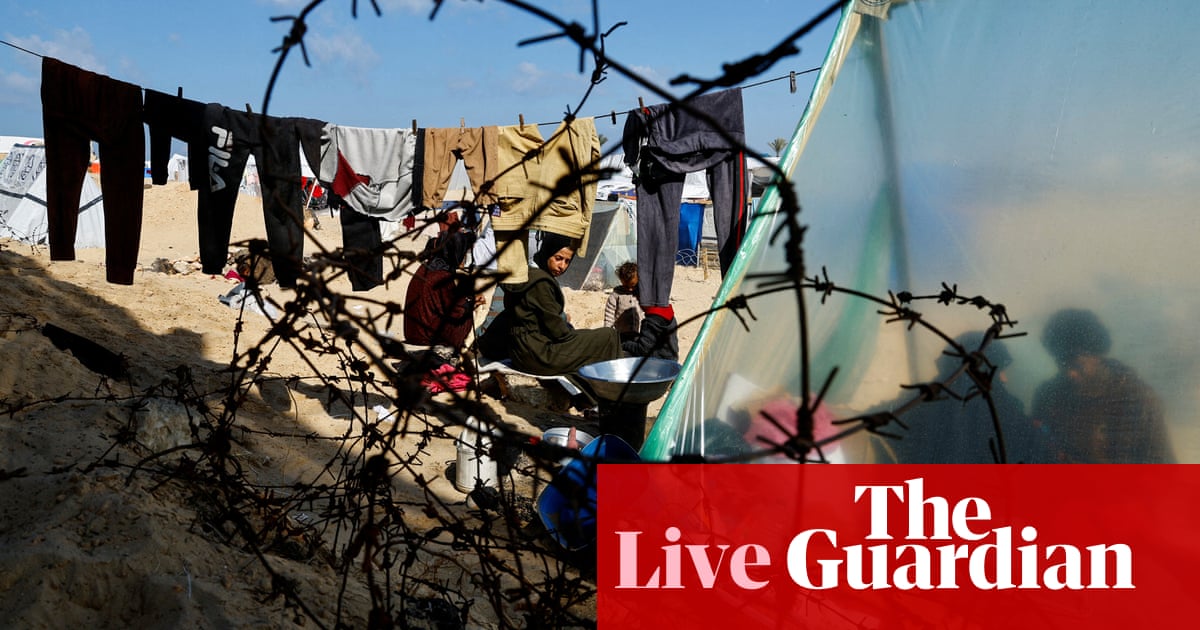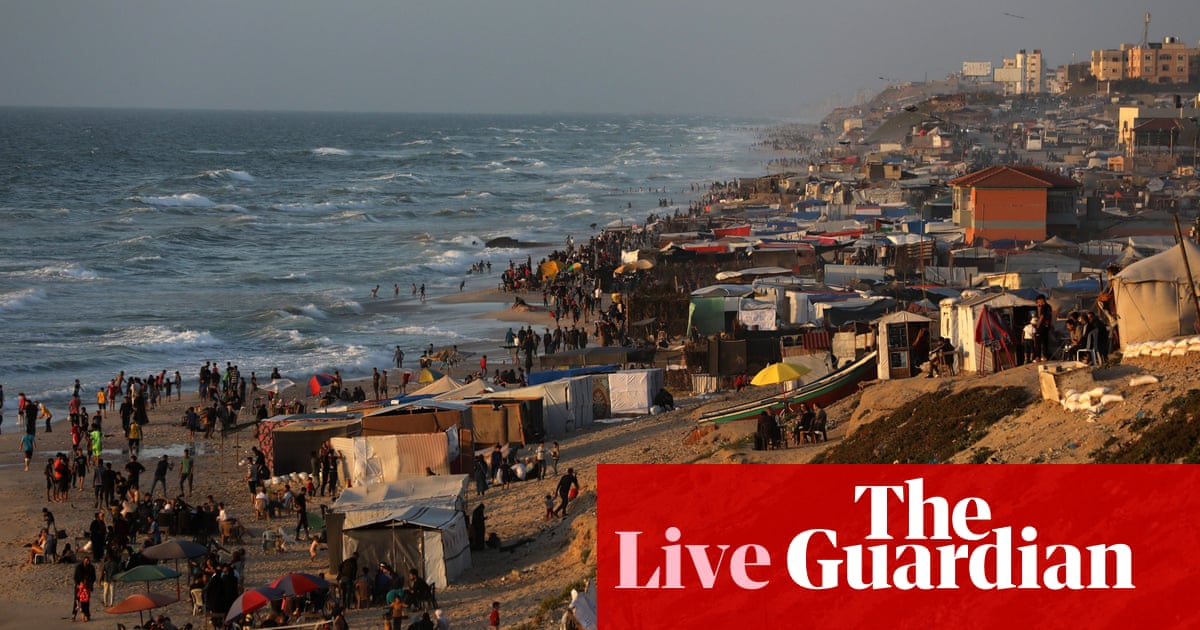
Hamas delegation arrive in Cairo for truce talks
Hamas negotiators have arrived in Cairo for further talks on a possible Gaza truce, a Hamas official told Reuters.
“The results today will be different. We have reached an agreement over many points, and a few points remain,” one Egyptian security source told Reuters.
An unnamed Palestinian official familiar with the mediation efforts also expressed cautious optimism, telling Reuters: “Things look better this time but whether an agreement is on hand would depend on whether Israel has offered what it takes for that to happen.”
Negotiations have been impeded by Hamas’ long-standing demand for Israel to commit to ending its offensive clashing with Israel’s insistence on resuming its operations to dismantle Hamas following any truce.
The Hamas delegation travelled to Cairo from its movement’s headquarters in Qatar, which along with Egypt, is involved in mediating the negotiations.
The CIA’s director William Burns had arrived on Friday with the purpose of indirect diplomacy, Reuters reported, citing Egyptian sources.
Summary
We’re wrapping up this blog for the day. Here is a recap of the day’s developments:
The Hamas delegation arrived in Cairo earlier on Saturday and has begun talks with Qatari and Egyptian mediators on a possible Gaza truce. Taher Al-Nono, a Hamas official and advisor to Hamas’ chief, told Reuters that Hamas was dealing with their proposals “with full seriousness and responsibility” – but reiterated demands for a full end to the war.
The delegation’s arrival comes after a senior Hamas spokesperson told Al Jazeera that Israel’s planned Rafah assault was another “key” issue.
The issue of lasting peace is proving a challenge in negotiations: Hamas has long called for Israel to commit to ending its offensive, while Israel continues to rule this out, insisting that any ceasefire will be followed by its army resuming fighting in order to root out Hamas.
Israel has briefed the US on its plan to evacuate Palestinian civilians during a planned offensive on the southern city of Rafah, US officials familiar with the matter have told AP – but the US administration reportedly remains unchanged in its view that the assault would risk too many civilian lives.
Israeli forces killed at least three Palestinians during an overnight raid in a village near the city of Tulkarm in the occupied West Bank, Reuters reports, citing Palestinian officials and its reporter at the scene.
A final bit of context as we wait for further updates from Cairo. Anonymous sources from different delegations have offered varying views on the negotiations: AP reports that Egyptian and US mediators have told of signs of compromise in recent days, and Reuters reports that an unnamed Palestinian official voiced cautious optimism.
But an Israeli official downplayed the prospects for a full end to the war – one of Hamas’ longstanding demands – telling AP Israel was committed to the Rafah invasion and that it will not agree to end the war as part of a deal to release hostages.
We’ll be shutting this blog shortly – thank you for reading.
Israeli forces have shelled a mosque in the town of Al-Fukhari, east of Khan Younis in the southern Gaza Strip, according to Al Jazeera, which cites its correspondent.
Israeli shelling also hit the towns of al-Mughraqa and az-Zahra in central Gaza, according to the report.
It remains unclear if there have been casualties.
Israeli forces kill at least three Palestinians during overnight West Bank raid
Israeli forces killed at least three Palestinians during an overnight raid in a village near the city of Tulkarm in the occupied West Bank, according to Palestinian officials and a Reuters reporter present.
The Palestinian health ministry said one of the Palestinians had died on the way to hospital on Saturday following the raid in Deir al-Ghusun, while a Reuters reporter at the scene saw Israeli forces leave the village with two other bodies.
The Israeli military said it was conducting “counterterrorism activities in the area”.
The raid was the latest in a series of clashes between Israeli forces and Palestinians in the occupied West Bank that have been ongoing for years but have stepped since the war began. At least 460 Palestinians have been killed by Israeli forces or Jewish settlers in the West Bank or East Jerusalem since 7 October, according to the Palestinian health ministry.
US secretary of state Antony Blinken has said that Israeli prime minister Benjamin Netanyahu’s handling of the Israel-Hamas war reflects the position of “a large majority of Israelis”, the Times of Israel reports.
The Times of Israel quotes Blinken as saying at an event in Arizona: “This is a complicated government. It’s a balancing act when you have a coalition. And if you’re just looking at the politics of it, that’s something that he has to factor in.”
The outlet reported that Blinken said that regardless of views on Netanyahu and his government, “what’s important to understand is that much of what he’s doing is not simply a reflection of his politics or his policies; it’s actually a reflection of where a large majority of Israelis are in this moment”.
Polls last month show nearly three-quarters of the Israeli public want Netanyahu to resign. 68% said Netanyahu is not doing well in his handling of the war, compared with 29% who said he is, the poll by Kan found, according to the Times of Israel. Respondents were also asked whether the government is “doing enough to bring back the hostages,” to which 56% responded that it was not and 39% said it was.
A bit of further context: the surveys come after a poll in January showed the majority of Israelis (81.5%) believed the best way to secure the release of hostages was by exerting military pressure on Hamas until it agreed to terms acceptable to Israel for their release.
In the same January poll, the public was asked whether the release of hostages or victory against Hamas was more important, with a slight majority of 46.6% responding that it was more important that the hostages be released, and 44.8% choosing the war’s outcome.
At the Jerusalem theatre this week, concertgoers and staff expressed a mixture of anger, sadness and defiance as weeks of pro-Palestinian protests across dozens of US college campuses reached a tumultuous climax 6,000 miles away.
The noisy demonstrations have been closely followed in Israel, reported by major media and discussed by prominent public figures.
Idan Degani, a security guard at the theatre, said many in Israel viewed the protests with confusion and anxiety, seeing them as an attack on the country and not just its government.
“We didn’t know so many people hated Israel. I don’t think these young people know a lot about Israel or about the conflict. I think the older people do, but not this younger generation,” the 28-year-old said, as he watched late arrivals hurry for a programme of Haydn and Schubert. “I certainly don’t think it will change how anyone here sees the war.”
Such feelings appear widespread among the Jewish majority in Israel, seven months after war was triggered by surprise attacks launched by Hamas into the south of the country in which about 1,200 people, mostly civilians, were killed and 250 taken hostage.
“We thought we understood how much hate there was out there. I mean, I’m a child of Holocaust survivors, but it’s still such a shock. It makes it unbelievably real,” said Danae Marx, a public relations specialist at the Hebrew University in Jerusalem.
In Bethlehem, food stalls are sparse as farmlands are under attack. The Guardian spoke to a Palestinian restauranteur about the fight to keep his people’s heritage alive through food.
Fadi Kattan looked forlornly at the stalls inside the Bethlehem vegetable market bearing small quantities of oranges, watermelons and cauliflowers. “This stall should be heaped with products, he said. “And over there should be piles of aubergines and courgettes.”
The watermelons from Jenin looked too small for the season, while he wasn’t sure where the boxes of oranges were from. They would normally be from Gaza. At Um Nabil’s stall in the West Bank market where Kattan is a regular customer, she told him she could no longer afford to bring in the best small local cucumbers or piles of green cherries from her village of Artas.
Kattan, a chef with restaurants in Bethlehem and in London, opens his forthcoming book, named after the city where he grew up, by saying cooking is “how I tell Bethlehem’s story”. It was after the book had gone to print, when on 7 October Hamas attacked towns and kibbutzim in southern Israel, followed by an intense Israeli bombardment of Gaza, that daily life changed dramatically.
The destruction of Gaza’s agricultural land has meant no citrus, strawberries or vegetables, which would normally be sold in the West Bank at this time of year. A wave of attacks from Israeli settlers in the West Bank, combined with road closures and raids by Israeli forces, has also left farmers in the towns around Bethlehem struggling to farm or bring their products to market.
Summary
Here is a quick roundup of where we are today:
Hamas negotiators have arrived in Cairo for further talks on a possible Gaza truce.
The delegation’s arrival comes after a senior Hamas spokesperson reportedly said that ceasefire talks remain ongoing, with Israel’s planned Rafah assault a “key” issue.
A stumbling block in the talks has been a longterm ceasefire: Hamas has long called for Israel to commit to ending its offensive; while Israel insists that a truce will be followed by it resuming fighting in order to root out Hamas.
The Hamas-run Gaza health ministry has published the latest casualty figures: at least 34,654 Palestinians have been killed, and 77,908 injured. It said 32 people were killed and 41 injured in the latest 24-hour reporting period.
Israel has briefed the US on its plan to evacuate Palestinian civilians during a planned offensive on the southern city of Rafah, US officials familiar with the matter have told AP – but the US administration reportedly remains unchanged in its view that the assault would risk too many civilian lives.
Meanwhile, Prof Ghassan Abu-Sittah, the British-Palestinian rector of the University of Glasgow and a reconstructive surgeon, has said he has been denied entry to France, where he was due to make a speech at the Senate.
Hamas delegation arrive in Cairo for truce talks
Hamas negotiators have arrived in Cairo for further talks on a possible Gaza truce, a Hamas official told Reuters.
“The results today will be different. We have reached an agreement over many points, and a few points remain,” one Egyptian security source told Reuters.
An unnamed Palestinian official familiar with the mediation efforts also expressed cautious optimism, telling Reuters: “Things look better this time but whether an agreement is on hand would depend on whether Israel has offered what it takes for that to happen.”
Negotiations have been impeded by Hamas’ long-standing demand for Israel to commit to ending its offensive clashing with Israel’s insistence on resuming its operations to dismantle Hamas following any truce.
The Hamas delegation travelled to Cairo from its movement’s headquarters in Qatar, which along with Egypt, is involved in mediating the negotiations.
The CIA’s director William Burns had arrived on Friday with the purpose of indirect diplomacy, Reuters reported, citing Egyptian sources.
Students involved in a pro-Palestinian encampment protest on the grounds of Trinity College in Dublin have vowed to maintain their action “indefinitely”.
Visitors were unable to access the historic Book of Kells on Saturday due to the action that began on Friday evening when student activists set up tents on the university campus, the PA news agency reports.
Photos on social media showed benches stacked up blocking the entrance to the manuscript and tourist attraction. Protesters have vowed to keep up a “blockade” of the Book of Kells until the university cuts its ties to Israel.
Trinity College said the encampment was “unauthorised”, and while it supported the right of students to protest, such action must be taken within the rules of the university. Organisers said 70 students in 43 tents took part.
Outgoing students’ union president Laszlo Molnarfi said he and fellow protesters would remain indefinitely.
“We plan on staying here indefinitely, our message is there is no business as usual during a genocide,” he told the PA news agency.
“And when our academic institution, Trinity College Dublin, has ties to Israeli companies, entities and universities that are complicit in the war industry, we must speak up.
“And that is why we are doing this. And we must speak up in this disruptive, powerful way. Because when we tried to engage with the authorities, with petitions and letters and meetings, we were met with shameful silence.”
Ceasefire talks ongoing while Rafah assault a "key" issue, Hamas spokesperson reportedly says
Ceasefire talks mediated by Qatar and Egypt continue, a senior Hamas spokesperson has told Al Jazeera, with Israel’s planned assault on Rafah a “key element”.
Osama Hamdan told the Qatari-owned outlet that that negotiations are still ongoing. “And it’s clear that we are moving forward. There are some good points,” Hamdan told the outlet. “But till now, we are still talking about the main issue, which is the complete ceasefire and complete withdrawal from Gaza. We hope to find some good and positive answers today.”
Hamdan said that one of the “key elements” under discussion is Netanyahu’s planned Rafah assault.
“Unfortunately, there was a clear statement from Netanyahu saying that regardless to what may happen, if there was a ceasefire or not, he will continue the attack,” he told Al Jazeera. “That means there will be no ceasefire, and that means that the attack will be continued, which is against what we are discussing.”
“At least we want to know exactly what does it mean, his statement, and the reaction from the mediators. Our understanding that any achievement for a ceasefire means that there will be no more attacks against Gaza and Rafah,” he said.
Further detail and background on Prof Ghassan Abu-Sittah, the plastic and reconstructive surgeon who was denied entry to France, where he was due to speak to the French senate later today. Abu-Sittah has provided testimony on the war in Gaza after operating there during the conflict.
After arriving at Paris’ Charles De Gaulle Airport, Prof Ghassan Abu-Sitta, a plastic and reconstructive surgeon, was informed by French authorities that Germany has enforced a Schengen-wide ban on his entry to Europe.
“They are preventing me from entering France. I am supposed to speak at the French Senate Today,” said Sitta, who remains under French detention. “Fortress Europe silencing the witnesses to the genocide while Israel kills them in prison.”
During the months of October and November 2023 at the beginning of Israel’s war on Gaza that has since killed more than 34,000 Palestinians, Abu-Sittah operated from Gaza’s Al Shifa and Al Ahli Baptist hospitals. During his 43 days, he described witnessing a “massacre unfold” in Gaza and the use of white phosphorus munitions, which Israel has denied. He has also provided evidence to Scotland Yard.
The International Centre of Justice for Palestinians (ICJP) called his detention an “unacceptable harassment of a globally respected medical professional”.
“By design, the Germans are silencing a key witness to Israel’s war crimes. This follows their action taken on 12 April to bar Dr Abu Sitta’s entry to Berlin to participate in the Palestine Congress - an event which German police later disbanded,” the independent organisation said in a statement.
“ICJP are instructing lawyers in France and Germany to see that the German’s authoritarian crackdown on free speech and witness testimony won’t stand,” ICJP director Tayab Ali said.
British-Palestinian surgeon and university rector says he was barred from entering France
Prof Ghassan Abu-Sittah, the British-Palestinian rector of the University of Glasgow and a reconstructive surgeon, has said he has been denied entry to France, where he was due to make a speech at the Senate.
“I am at Charles De Gaulle airport. They are preventing me from entering France. I am supposed to speak at the French Senate today. They say the Germans put a 1 year ban on my entry to Europe,” Abu-Sittah wrote on X, formerly Twitter.
“Fortress Europe silencing the witnesses to the genocide while Israel kills them in prison,” he added.
In April, Abu-Sittah was prohibited from entering Germany, where he was due to talk of his experiences in Gazan hospitals.
The surgeon spent 43 days in Gaza to help treat injured people last year, and in October alleged that counter-terror police “harassed” his family at his home in London. He told BBC Newsnight that officers questioned his wife about why he had travelled to Gaza, who paid for his ticket and which charity he was helping.
As summer approaches, Palestinians face the further risk of extreme temperatures exacerbated by climate change, relief organisations have warned.
The heat will bring with it disease-spreading mice and rats, said Louise Wateridge, an UNRWA communications officer in Rafah told Bloomberg, while diarrhoea and Hepatitis A are also concerns.
“There’s nowhere to safely get rid of trash,” Wateridge told the outlet. “You’ve got people living under these sheets of plastic in this very unstable environment. It’s not going to improve at all.”
The warning come after Rafah recorded temperatures of 39.1C (102F) on 14 April – 14C higher than the 30-year average for that date. Although temperatures cooled in following days, fears remain that summer may bring far higher heat risks and people in Rafah have no way to cool down in plastic tents.
The heatwave had devastating consequences:
At least two children died from heat-related causes, Philippe Lazzarini, Commissioner General of the Palestinian relief agency UNRWA, said on X, formerly Twitter.
An 18-year-old Palestinian woman, Lara Sayegh, also died in the heatwave.
At least 34,654 Palestinians have been killed - Gaza health ministry
Reuters has the latest figures on Palestinian casualties since the Israel-Hamas war in Gaza began:
At least 34,654 Palestinians have been killed, and 77,908 injured, the Hamas-run Gaza health ministry said in a statement.
The ministry added that 32 people were killed and 41 injured in the latest 24-hour reporting period.
Israeli warplanes have attacked targets in Khan Younis, southern Gaza, after a rocket was launched towards the Ein Hashlosha kibbutz in Israel on Friday, the IDF has said.
The Israeli army said in a statement on X, formerly Twitter, that the rocket fell in an area near the border fence between Israel and southern Gaza.
Fighter jets also struck mortar shell positions in central and southern Gaza that were aimed at Israel and Israeli forces, the statement said.
The Israeli navy conducted strikes along Gaza’s coast over the past day, supporting the IDF’s ground forces in central Gaza, the military added.
A small number of US universities have reached deals with pro-Palestinian student protesters following weeks of demonstrations.
With more than 2,400 people on 46 campuses nationwide since mid-April, AP reports that schools including Brown, Northwestern and Rutgers stand out for taking a different approach.
Agreements from such schools included commitments to review their investments in Israel or hear calls to stop doing business with the country. Many protester demands have focussed on links to the Israeli military.
But while universities have made concessions around amnesty for protesters and funding for Middle Eastern studies, they have not promised to change their investments.
Ralph Young, a history professor who studies American dissent at Temple University in Philadelphia, said concessions and negotiations may be being used tactically.
“I think for some universities, it might be just a delaying tactic to diffuse the protests,” said Young. “The end of the semester is happening now. And maybe by the time the next semester begins, there is a ceasefire in Gaza.”
Some university boards may never even vote on divesting from Israel, which can be a complicated process, Young said. And some state universities have said they don’t have the authority to do so.
But Young said holding talks with protesters is a better tactic than arrests, which can stir up further protests. Talking “at least gives the protesters the feeling that they’re getting somewhere,” he said. “Whether they are getting somewhere or not is another question.”
Chef Fadi Kattan is working to keep Palestinian heritage alive through food in increasingly difficult circumstances as farmlands come under attack.
The chef, who has restaurants in Bethlehem and London, tells the Guardian’s Ruth Michaelson and Quique Kierszenbaum how seven months of war have devastated the Bethlehem’s economy: “Restaurants in the centre of the city are either shut down or are now opening at most two days a week. This is partly about tourism, but also people can’t afford it. Who in Bethlehem can afford grilled meat and mezes in a restaurant? Not many.”
Showcasing Palestinian cuisine at Kattan’s restaurant Akub in west London, and his forthcoming book, are about maintaining a connection with land increasingly under threat.
“There is systematic destruction of heritage happening in Gaza … I really feel we are disappearing,” he said. Across the West Bank, he added, “the lands are disappearing and the farmlands are being attacked.”
Israel has briefed the US on its plan to evacuate Palestinian civilians during a planned offensive on the southern city of Rafah, US officials familiar with the matter have said.
The officials, who spoke to AP on condition of anonymity, said the Israeli plan did not change the US administration’s view that proceeding with a ground operation in the city where 1.2 million civilians are sheltering would risk too many lives. The World Health Organization has warned has warned that the assault could lead to a “bloodbath”.
But Israeli prime minister Benjamin Netanyahu has said he will press ahead with the operation in Rafah despite warnings from president Joe Biden and others on the humanitarian consequences.
The Biden administration has said there could be consequences for Israel if it goes ahead with the operation without a credible plan to shield Palestinian civilians.
“Absent such a plan, we can’t support a major military operation going into Rafah because the damage it would do is beyond what’s acceptable,” U.S. Secretary of State Antony Blinken said late Friday at the Sedona Forum, an event in Arizona hosted by McCain Institute.
White House press secretary Karine Jean-Pierre told reporters on Friday that Israel had not shown a “comprehensive” plan for a potential Rafah operation to the White House.
Rafah assault "could lead to a bloodbath", WHO chief warns
An Israeli military incursion into Gaza’s southern city of Rafah could lead to a “bloodbath”, the World Health Organization warned Friday, announcing contingency plans, AFP reports.
WHO director general Tedros Adhanom Ghebreyesus warned of possible dire implications for the 1.2 million people sheltering in Rafah.
“WHO is deeply concerned that a full-scale military operation in Rafah, Gaza, could lead to a bloodbath, and further weaken an already broken health system,” the director general said on X, formerly Twitter.
In a statement, the WHO announced contingency efforts, but warned “the broken health system would not be able to cope with a surge in casualties and deaths that a Rafah incursion would cause”.
According to the WHO, most of the besieged territory’s health facilities have been damaged or destroyed amid heavy Israeli bombardment.
Only 12 of Gaza’s 36 hospitals and 22 of its 88 primary health facilities are “partially functional”, the UN health agency said.
“As part of contingency efforts, WHO and partners are urgently working to restore and resuscitate health services,” the statement said.
It added that Rafah’s three currently operational hospitals would become unreachable “when hostilities intensify in their vicinity”.
A new sea route for Gaza aid is on track, USAid says
On-the-ground preparations are on track in Gaza for humanitarian workers to be ready to deliver food, treatment for starving children and other urgent assistance by early or mid-May when the American military expects to finish building a floating pier to receive the shipments, according to a US Agency for International Development (USAid) official, the Associated Press reports.
Ramping up the delivery of aid on a planned US-backed sea route will be gradual as aid groups test the distribution and security arrangements for relief workers, the USAid official said.
These were some of the agency’s first comments on the status of preparations for the Biden administration’s $320m Gaza pier project, for which USAid is helping coordinate on-the-ground security and distribution.
With the Israel-Hamas war stretching close to seven months and Israel restricting humanitarian aid, half of Gaza’s 2.3 million people are at imminent risk of famine, international health officials say. Under pressure from the US and others, Israeli officials in recent weeks have begun slowly reopening some border crossings for relief shipments.
But aid coming through the sea route, once it’s operational, still will serve only a fraction – half a million people – of those who need help in Gaza. Aid organisations including USAid stress that getting more aid through border crossings is essential to staving off famine in the territory.
Hamas official accuses Netanyahu of trying to derail Gaza truce deal
A top Hamas official has accused Israeli prime minister Benjamin Netanyahu on Friday of trying to derail a proposed Gaza truce and hostage release deal with his threats to keep fighting the Palestinian militant group, AFP reports.
“Netanyahu was the obstructionist of all previous rounds of dialogue … and it is clear that he still is,” said senior Hamas official Hossam Badran.
Badran charged that Netanyahu’s insistence on attacking Rafah was calculated to “thwart any possibility of concluding an agreement” in the negotiations brokered by Egyptian, Qatari and US mediators.
Foreign mediators have waited for a Hamas response to a proposal to halt the fighting for 40 days and exchange hostages for Palestinian prisoners, which its chief Ismail Haniyeh has said the group was considering in a “positive spirit”.
A major stumbling block has been that, while Hamas has demanded a lasting ceasefire, Netanyahu has vowed to crush its remaining fighters in the far-southern city of Rafah, which is packed with displaced civilians.
Netanyahu has insisted he will send ground troops into Rafah, despite strong concerns voiced by UN agencies and ally Washington for the safety of the 1.2 million civilians inside the city.
World Health Organization chief Tedros Adhanom Ghebreyesus said the agency was “deeply concerned that a full-scale military operation in Rafah … could lead to a bloodbath and further weaken an already broken health system.”
Israeli airstrikes killed several more people in Rafah overnight, Palestinian medics and the civil defence agency said.
Top UN official warns northern Gaza now in "full-blown famine"
A top UN official said Friday that hard-hit northern Gaza was now in “full-blown famine” after more than six months of war between Israel and Hamas and severe Israeli restrictions on food deliveries to the Palestinian territory, the Associated Press reports.
Cindy McCain, the American director of the UN World Food Program, became the most prominent international official so far to declare that trapped civilians in the most cut-off part of Gaza had gone over the brink into famine.
“It’s horror,” McCain told NBC’s Meet the Press in an interview to air Sunday. “There is famine – full-blown famine – in the north, and it’s moving its way south.”
She said a ceasefire and a greatly increased flow of aid through land and sea routes was essential to confronting the growing humanitarian catastrophe in Gaza, home to 2.3 million people.
There was no immediate comment from Israel, which controls entrance into Gaza and says it is beginning to allow in more food and other humanitarian aid through land crossings.
The panel that serves as the internationally recognised monitor for food crises said earlier this year that northern Gaza was on the brink of famine and likely to experience it this month. The next update will not come before this summer.
Hamas sends delegation to Cairo to resume Gaza ceasefire talks
Hamas said on Friday it was sending a delegation to Cairo to discuss a deal for a truce and the release of hostages in Gaza, hours after US CIA director William Burns arrived in the Egyptian capital, Reuters reports.
Hamas and CIA officials will meet Egyptian mediators on Saturday, an Egyptian security source said, though it was unclear whether they would meet separately or together.
Hamas said its delegates were travelling to Cairo in a “positive spirit” after studying the latest proposal for a truce agreement.
“We are determined to secure an agreement in a way that fulfils Palestinians’ demands,” the Palestinian militant group said in a statement.
A US official said they believed there had been some progress in talks but was still waiting to hear more.
US secretary of state Antony Blinken said Hamas was the only hold up to a Gaza ceasefire as the militants prepared to send a delegation back to Cairo on Saturday for talks.
“We wait to see whether, in effect, they can take yes for an answer on the ceasefire and release of hostages,” Blinken said late Friday.
“The reality in this moment is the only thing standing between the people of Gaza and a ceasefire is Hamas.”
Ceasefire talks have continued for months without a decisive breakthrough. Israel has said it is determined to eliminate Hamas, while Hamas says it wants a permanent ceasefire and a full Israeli withdrawal from Gaza.
Egypt made a renewed push to revive negotiations late last month. Cairo is alarmed by the prospect of an Israeli ground operation against Hamas in Rafah in southern Gaza, where more than one million people have taken shelter near the border with Egypt’s Sinai Peninsula.
Egyptian sources say both sides have made some concessions recently, leading to progress in the talks, though Israel has continued to say an operation in Rafah is imminent.
Opening summary
Welcome back to our continuing live coverage of the Israel-Gaza war and the wider Middle East crisis, I’m Clea Skopeliti bringing you the latest news.
Hamas said on Friday it was sending a delegation to Cairo to resume Gaza ceasefire talks, hours after US CIA director William Burns arrived in the Egyptian capital, according to Egyptian sources.
Israel this week briefed Biden administration officials on a plan to evacuate Palestinian civilians ahead of a potential operation in the southern Gaza city of Rafah aimed at rooting out Hamas militants, according to US officials familiar with the talks.
A top UN official has said that hard-hit northern Gaza was now in “full-blown famine” after more than six months of war between Israel and Hamas and severe Israeli restrictions on food deliveries.
More details shortly, but first here is a roundup of other key developments:
Scores of Democrats in the US House on Friday urged president Joe Biden to consider halting arms sales to Israel if it does not alter the conduct of its war against Hamas. In a letter signed by 86 Democratic members of Congress, lawmakers voiced “serious concerns regarding the Israeli government’s conduct of the war in Gaza as it pertains to the deliberate withholding of humanitarian aid,” reports Agence France-Presse. The Democrats are pressuring Biden to make clear to Israeli prime minister Benjamin Netanyahu that any impediment to aid delivery to Gaza was “risking its eligibility for further offensive security assistance from the United States”.
An Israeli incursion in Rafah could result in ‘slaughter’, a UN official said on Friday. “It could be a slaughter of civilians and an incredible b




